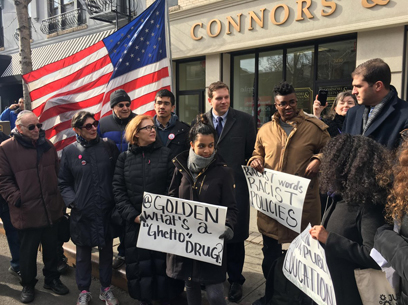Demonstrators rallied outside the district office of a Bay Ridge state senator on Jan. 29 to protest a comment he made about drug addiction in a recent interview that many locals and officials called racially charged.
State Sen. Marty Golden told The Brooklyn Daily Eagle that the opioid epidemic — and heroin addictions in particular — are affecting people from various socioeconomic strata, saying, “It’s not a ghetto drug. It’s happening to doctor’s kids.” The group of about 10 protesters said that Golden’s comment not only conveyed a racist stereotype, but also reflected a selective concern about victims of drug addiction.
“He is saying we should only take action when issues affect some people and not others,” said Alex Pellitteri of Bay Ridge for Social Justice. “That is racist and that is divisive.”
Borough President Adams, councilmen Justin Brannan (D–Bay Ridge) and Mark Treyger (D–Coney Island), and other local pols quickly condemned the comments, with critics complaining that Golden’s words underscored how the epidemic has only become a matter of national concern because many of its victims are white — even though drug overdoses and addiction have long devastated communities of color. A rep from a group that seeks to reduce harm of both drug abuse and prohibition who was at the protest said that Golden needs to own up to his divisive comments and commit to making policy changes to tackle the problem in a comprehensive way.
“Sen. Golden needs to be held accountable for what he said,” said Dionna King of the Drug Policy Alliance. “We want to make sure that he not only apologizes, but that he changes the way that he thinks about this drug crisis, and supports policies that are helpful for all people. The opioid crisis has shed a light on the hypocrisy of the drug war, and it’s time to make changes.”
Another protester echoed King’s comments, adding that they harkened back to the attitudes that drove the zero-tolerance “war on drugs” throughout the 1970s and ’80s and contributed to the over-incarceration of people of color.
“It’s ideology like Sen. Golden’s that fueled the war on drugs, that criminalized black and brown communities,” said Maria Bautista. “And now, because it’s affecting white affluent families, he’s going to start making differentiations between which drugs are ‘ghetto drugs’ and which drugs are not, and that’s racism.”
Golden — who serves on the state Senate’s Heroin Task Force — was in Albany at the time of the protest, and wrote in a tweet that the protesters were from “fringe groups” and that a Facebook post advertising the event was “insurgent.” He apologized for his comments in a series of tweets three days after they were published, writing that he was sorry “to anyone who was offended” by his words, and that he meant to say the crisis was devastating communities throughout the state.
Golden’s two Democratic challengers, Ross Barkan and Andrew Gounardes, attended the protest and said that apology was too little, too late.
Barkan said that the comments — coupled with last month’s widely publicized incident in which a cyclist accused Golden of impersonating a police officer — showed the pols’ true colors.
“An apology is not good enough. It came two days after political pressure had built on him to say something,” Barkan said. “I think [this and last month’s incident] say similar things about his character: he really doesn’t care. He really has no regard for consequences, for what other people think.”
Gounardes agreed, adding that the back-to-back blunders prove the pol thinks the rules do not apply to him.
“This is par for the course for Marty Golden: he’s always felt that he’s above the law and that what he says or what he does doesn’t matter, so this is really no surprise,” he said.
But Golden’s spokesman, who was at the office with two other staffers during the protest, said he was surprised that the crowd was so small, given the amount of publicity the comments got, and the number of groups organizing the protest.
“I’m just surprised that with five groups and two candidates, there’s only 10 people here,” said John Quaglione.

























